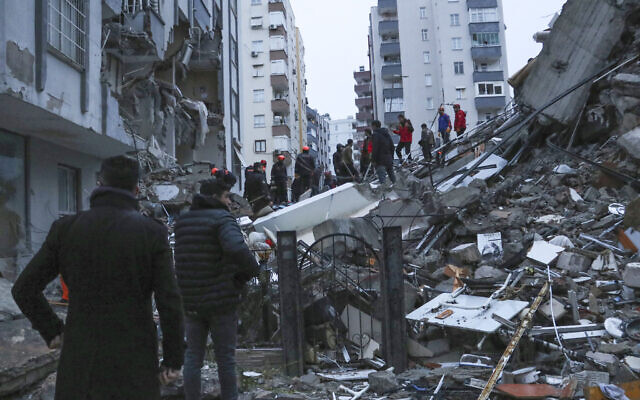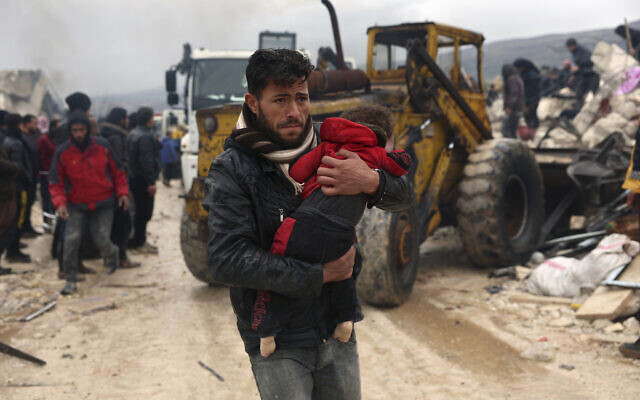Knesset to review earthquake readiness next week, as state comptroller sounds alarm
Englman says deadly regional temblors are a ‘bright warning light’ that action is needed to secure hundreds of thousands of buildings; PM orders NSC to carry out assessment

A top-level Knesset committee will hold an urgently called meeting next week to review the country’s readiness for earthquakes in the wake of the deadly temblors in Turkey and Syria that killed thousands of people.
Chairman of the Knesset’s Internal Affairs and Environment Committee Ya’akov Asher will invite all government ministries and emergency agencies to attend the meeting, the Knesset spokesperson said in a statement.
The meeting will examine the state of buildings and “the readiness of the emergency agencies to deal with a crisis.”
Meanwhile, Prime Minister Benjamin Netanyahu’s office said the premier had directed National Security Council chairman Tzachi Hanegbi to conduct a situational assessment regarding the government’s preparedness for earthquakes. Hanegbi will soon hold a meeting on the matter with representatives from all of the relevant ministries, the PMO said.
Also on Monday, State Comptroller Matanyahu Englman urged authorities to fortify the country against a potentially devastating earthquake, and pointed to the disaster in Turkey and Syria as indications of the urgency of doing so.
“The earthquakes should turn on a bright warning light to the government of Israel and the local authorities,” Englman said during a presentation he gave at his Jerusalem office to 12th graders from Katzir High School in Rehovot.
Earlier Monday, a powerful 7.8 magnitude earthquake rocked southeastern Turkey and northern Syria, toppling buildings and killing more than 2,300 people. The quake was also felt in some parts of Israel, though no damage or injuries were reported. There were more temblors felt in Turkey and Syria later in the day, including one that was of a magnitude of 7.5.

“Today, many in Israel felt the earthquake, and perhaps this is the last minute to make the proper preparations to prevent a disaster of this magnitude in our country,” Englman said. “Instead of waiting for a commission of inquiry after a disaster, the government should act on pre-disaster preparedness.”
Englman appealed to the interior ministry and the housing and construction ministry, saying: “Do not wait for such a disaster to occur in Israel. Act immediately on the country’s preparedness for earthquakes.”
The comptroller said his office would soon publish a report on the preparedness of local authorities for earthquakes and on the readiness of their emergency services for their aftermath. The review, conducted over the past year, has focused on five local authorities that lie along the Great Rift Valley — Beit She’an, Tiberias, Safed, Kiryat Shmona, and Hatzor HaGlilit — which are considered to be at the greatest risk. The report also examines various government ministries and other bodies, with an emphasis on the Interior Ministry, the national mapping center, and the inter-ministerial steering committee for preparing for earthquakes.

Englman noted that previous reports on those areas and others in the periphery have found that the state’s TAMA 38 plan that aims to strengthen at-risk buildings has not been sufficiently implemented and that other action is required instead.
Englman pointed to a 2018 report from his predecessor that estimated a major earthquake could kill 7,000 people and leave 170,000 homeless. Last year, a comptroller report found there were 600,000 buildings in the country that do not meet the standard for earthquake resistance.
“These apartments are in danger of collapsing if there is an earthquake here,” Englman said.
A Knesset information center report from November last year found that there is no set government policy on earthquake readiness, as no specific ministry has been given the responsibility for the matter. In addition, there is no accurate estimate of the total number of buildings at risk in the country.
The government launched the TAMA 38 plan in 2005 — an urban initiative designed to encourage tenants to strengthen their buildings’ structures.
However, it takes at least three years to have a building approved for TAMA 38, with the waiting period rising to almost five years in more populated sections of the country, like the Tel Aviv metropolitan area.

Coalition party leaders spoke about the earthquake during their weekly faction meetings at the Knesset.
Shas party leader Aryeh Deri referred to the lack of progress in strengthening buildings, telling his party’s MKs: “Israel is not prepared for such quakes, and has not done enough.”
Prime Minister Benjamin Netanyahu, at his Likud party faction meeting, said that he had instructed the head of the National Security Council, Tzachi Hanegbi, to update and reiterate “the steps we need to take and… the IDF Home Front orders for civilians.”
The prime minister called on all citizens “to carry out the instructions.”
Finance Minister Bezalel Smotrich, leading a meeting of his Religious Zionism faction, sent his condolences to Turkey and promised that Israel will help the country out of a sense of “mutual responsibility and solidarity.”

MK Benny Gantz, leader of the opposition National Unity party, told his faction he knows Israel “will lend a helping hand” to rescue efforts and humanitarian and medical aid.
Israel lies along an active fault line: the Great Rift Valley, or the Syrian African Rift, a tear in the earth’s crust that includes the area of the border separating Israel and Jordan. The last major earthquake to hit the region was in 1927 — a 6.2-magnitude tremor that killed 500 people and injured 700 — and seismologists estimate that such earthquakes occur in this region approximately every 100 years.









